65+ Social Proof Statistics that May Surprise You [2025]

![65+ Social Proof Statistics that May Surprise You [2025]](https://image.trustmary.com/w800/wp-content/uploads/2022/06/social-proof-statistics.png)
Social proof is not just a buzz word for marketers to sound fancy.
It has real effects.
These social proof statistics show you what we mean when we say social proof is crucial.
What Is Social Proof?
If you haven’t heard of social proof yet, here’s a brief explanation.
Social proof is a psychological phenomenon. It makes us search for behavioral cues from our peers, especially in new situations.
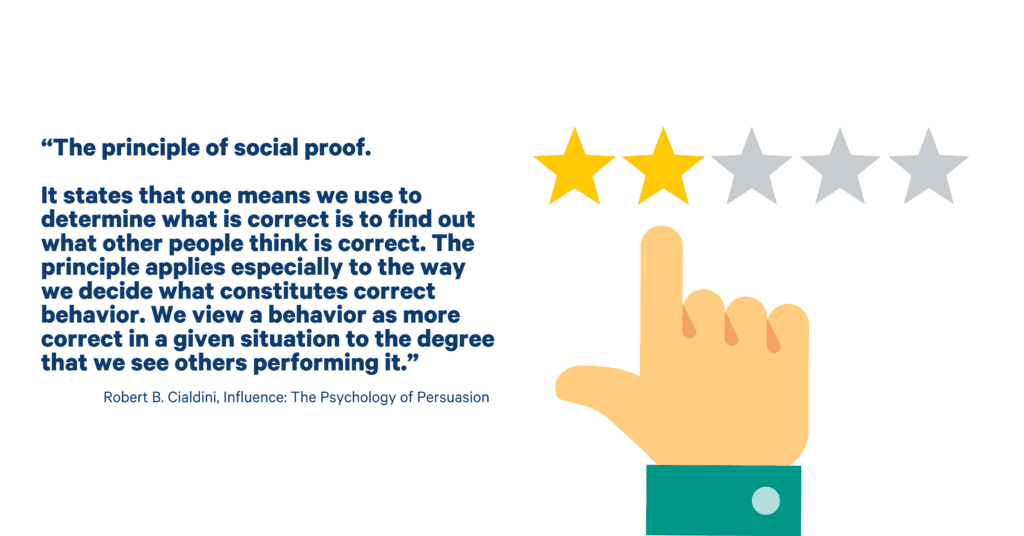
Real-Life Example of Social Proof
I visited a new yoga studio recently. I had been to yoga before, but not this particular class.
When I entered the room, I saw people laying down on their mats. They looked like they were sleeping.
I was confused, but I did the same. After all, that must be the correct way to do things here.
I also grabbed the exact same yoga equipment that everyone else was using, even though no one had given me instructions.
The same thing works in marketing, too. If you see a new online store, and you know nothing about it, you look for other people’s experiences.
You read reviews, check the chat forums and ask your friends.
Social proof is much more powerful than you probably realize.
Many people use ad blockers to not see advertisements. Social proof material from other consumers or influencers is a different story.
People generally trust other people’s opinions more than company representatives or branded promotional content.
That’s why social proof is such an important marketing tool for today’s businesses.
Covid-19 Pandemic and Social Proof
The past years have not been easy on local businesses.
The pandemic meant struggles for most businesses, but it also brought about new responsibilities.
Research shows that people held businesses accountable for not following the Covid-19 regulations.
On the other hand, there was the “Support your Local” campaign that encouraged people to buy from local businesses.
These phenomena were especially visible in people’s online behavior and how they wrote reviews.
Another consequence of social distancing and lockdowns was that people moved their business online. As a result, writing reviews has become more and more popular.
- 22% of customers gave positive reviews to support local businesses that were struggling because of the pandemic.
- During 2020 (the first year of the pandemic), U.S. consumers were more active review writers. 72% wrote more reviews than the year before, when the percentage was 66 in 2019.
- 67% of customers avoid businesses that do not follow Covid-19 health and safety measures.
- 17% would leave a negative review for a business that does nor follow the health and safety protocols.
- Review interaction has gone up 50% compared to the pre-pandemic times.
- 41% of shoppers interested in beauty products rely on reviews more than before Covid-19.
- Those who interact with online reviews are 25% more likely to convert today than before the pandemic.
- Reviews are around 20% shorter than before.
Sources: Bright Local, Power Reviews
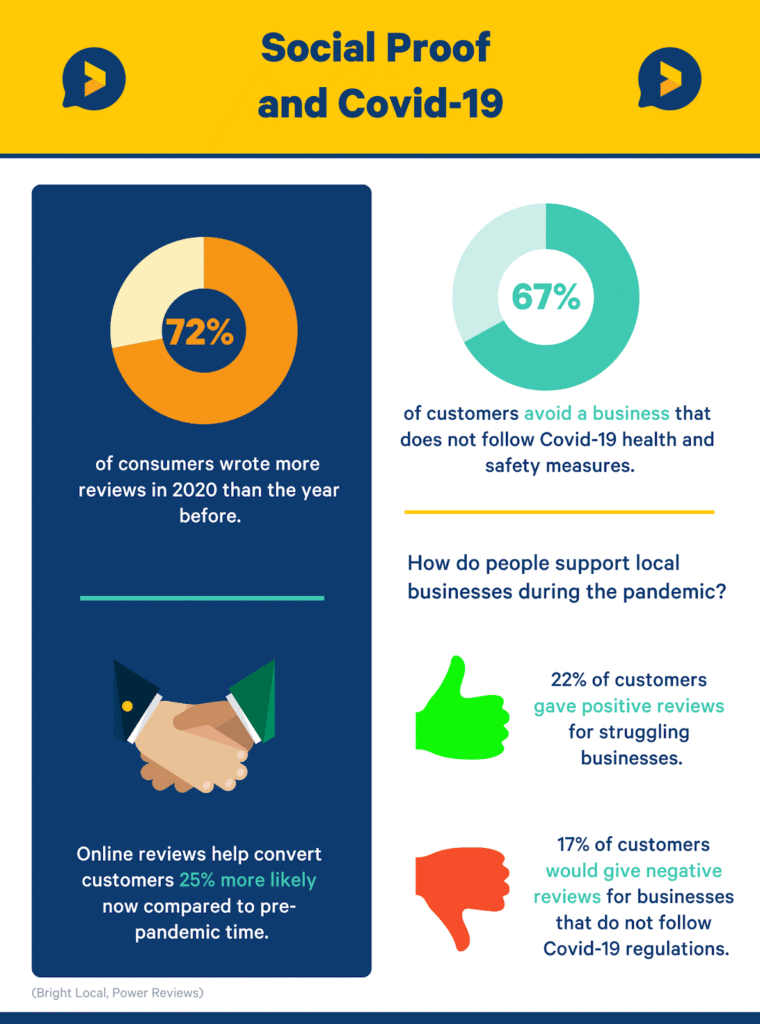
How Social Proof Is Represented in Social Media
Social media is definitely a big factor in commerce and marketing. At this point, you can’t deny it.
Traditionally, social media is the place for influencers to market products. While they still do, social media has a much bigger impact on shopping experiences than before.
People buy through social media platforms, share their opinions about products, and communicate with brands.
Let’s see what social proof statistics have to say about social media.
- 87% of online shoppers think that social media can help with making purchase decisions.
- 43% of consumers learn about new products through their social media networks.
- 21% of social media users in the U.S. say that they would like social media posts on a company page.
- 12% of social media users in the U.S. would share a brand’s post.
- Twitter is the holy grail of social media influencers. They generate over 5 times higher purchase intent in Twitter users.
- 49% of Twitter users listen to influencers’ recommendations.
- 19% of consumers in the U.S. use social media to find out more about the products or services that they are considering to buy.
Sources: Statista, Gurus Coach, Finances Online
Online Reviews Statistics
Reviews are one of the most used forms of social proof. They are the honest opinions of customers, often accompanied by a star rating.
You can find them on review sites like Google and Yelp.
Many websites also showcase customer reviews and testimonials on their own website to build trust and credibility.
Review statistics below should convince you about the importance of customer reviews.
- 93% of consumers read online reviews before deciding whether to purchase.
- 58% of consumers would be ready to pay more or travel further to visit companies that have good customer reviews.
- Only 9% of customers would be willing to engage with a business that has an average star rating of 1 or 2 stars.
- 94% of consumers have avoided a company because it has negative reviews.
- 80% of consumers say that they trust a brand more when the brand reacts to negative reviews or comments.
- When a brand removes negative reviews, 95% of consumers trust the brand less.
- Star rating between 4.2 and 4.5 is the most effective in terms of social proof.
- 80% of customers read online reviews on mobile phones.
- 63% read reviews on Google, 45% on Yelp, and around 25% use Tripadvisor or Facebook reviews.
- 88% of all reviews come from those four online review sites.
- 71% of people will submit a review if they are satisfied and the company provides an easy way to leave reviews.
- 20% of customers who leave reviews expect a reply the same day.
- Companies that have 200+ reviews have twice as much revenue compared to companies who have less than 200 reviews.
- An average local business has 39 Google reviews.
- Hotels have on average 309 reviews.
- 83% say that reviews are trustworthy only if they are fairly recent.
- 73% of consumers ignore reviews if they are older than one month old.
- 85% ignore reviews that are more than 3 months old.
- Consumers read on average 4-9 reviews before making a purchase decision.
- 49% of potential customers see the quantity of reviews as important.
- Showcasing 5 product reviews can increase conversions by 270%.
- 92% of online consumers say that negative reviews prevent them from making buying decisions.
Sources: Qualtrics, Findstack, Reviewtrackers, Northwestern, Service Direct, Bright Local, Status Labs, eMarketer, Review42, Forbes
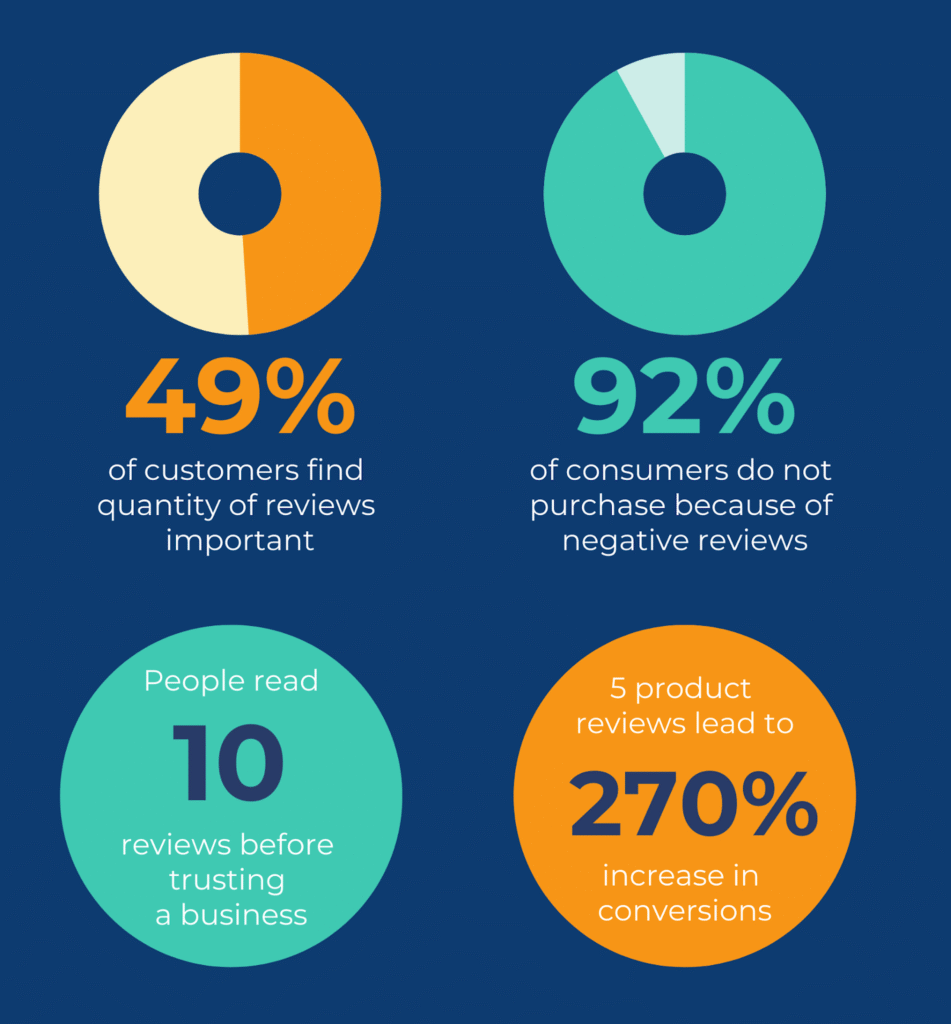
Stats in Visual Social Proof
Visual social proof refers to all social proof that is visually appealing, such as video testimonials, user images and infographics.
Image and video content are more popular than ever.
It is no surprise that social proof in the form of images and videos is also more effective than plain text.
When we see something with our own eyes, it instantly adds credibility.
Image also has a different emotional impact than text.
- 62% of consumers are more likely to make a purchase if they see photos and videos from other customers.
- 2 out of 3 consumers are more likely to buy something after watching a testimonial video.
- Replacing landing page reviews with video testimonials can increase the conversion rate by 80%.
- 79% of people have watched a testimonial video to get to know the company or its products and services better.
- 77% of people who have seen a video testimonial about a product or service say that it has motivated them to make a purchase.
Sources: Findstack, Wyzowl, Unbounce, Finances Online
B2B and Meaning of Social Proof
You might think that B2B buyers are immune to B2B online reviews and B2B trust elements of websites.
But why would they? B2B buyers are human, like regular consumers. They are also affected by psychology.
When you think about it, B2B buyers should be especially interested in authentic customer stories.
After all, they want to profit from their investments, whereas consumers can purchase things “just for fun”.
- Over 92% of B2B buyers say they are more likely to make a buying decision after reading a trustworthy review.
- 68.6% of B2B marketers rate reviews as an effective and valuable marketing asset.
- 61% of B2B buyers that read reviews want to see 11-50 reviews
- 65% of B2B buyers see reviews as very important when evaluating solution providers.
- Only 10% of B2B marketers think that influencer marketing is an effective lead generation tactic with high ROI.
Sources: Demand Gen Report, Statista, G2
Case Example: Changing from Logo Marketing to Testimonials
Every company has a logo reel on its website. It features the biggest and most prestigious logos.
But everyone has them, so are they really a differentiator anymore?
Which do you consider to be more trustworthy: Logos of huge customers, or comments from the people working at those companies that talk about the value of the service or product?
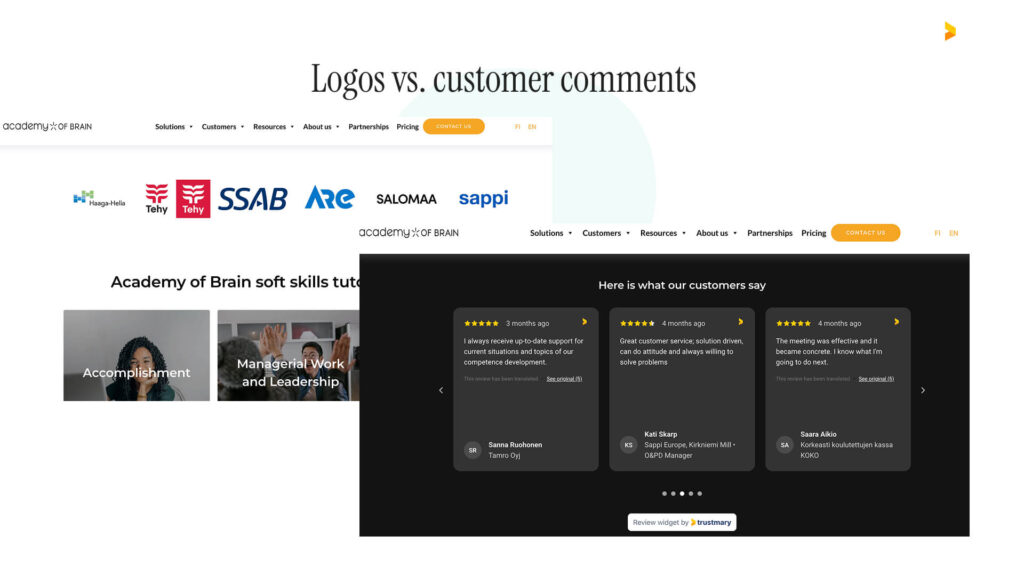
Academy of Brain noticed that its average time spent on the page, as well as overall sales, increased after adding social proof in the form of customer comments to its key landing pages.
Influencer Marketing
Influencer marketing is a significant source of social proof. Consumers like to relate to their favorite celebrities and influencers.
Generally, influencer marketing campaigns have a good return on investment.
It is also an ever-changing field with emerging new platforms and names.
Let’s see what the numbers say.
- 82% of consumers are highly likely to follow recommendations made by micro-influencers (10k-100k followers).
- 61% of consumers believe that micro-influencers create more authentic and trustworthy content compared to macro-influencers (over 100k followers)
- Between 2020 and 2021, the interest in using TikTok influencers rose 325%.
- 68% of marketers wanted to use TikTok in their marketing campaigns in 2021.
- Instagram still is the most popular social media platform for influencer marketing: 97% marketers used Instagram in 2021.
- While 62% marketers employed 10 or more influencers in one campaign in 2018, in 2021 the percentage is only 31%.
- 90% of enterprise marketers look to work with micro influencers (5k to 100k followers).
- The engagement rate of influencers’ posts is 8 times higher than content from brands directly.
- 14% of consumers say that celebrity endorsements do affect their purchase decisions.
- 40% of consumers have purchased a product online after an influencer has posted about using it on social media.
- Influencer marketing’s market value increased from $6.5 billion in 2019 to $13.8 billion in 2021.
Source: InfluencerMarketingHub, Linqia, Gurus Coach, Statista
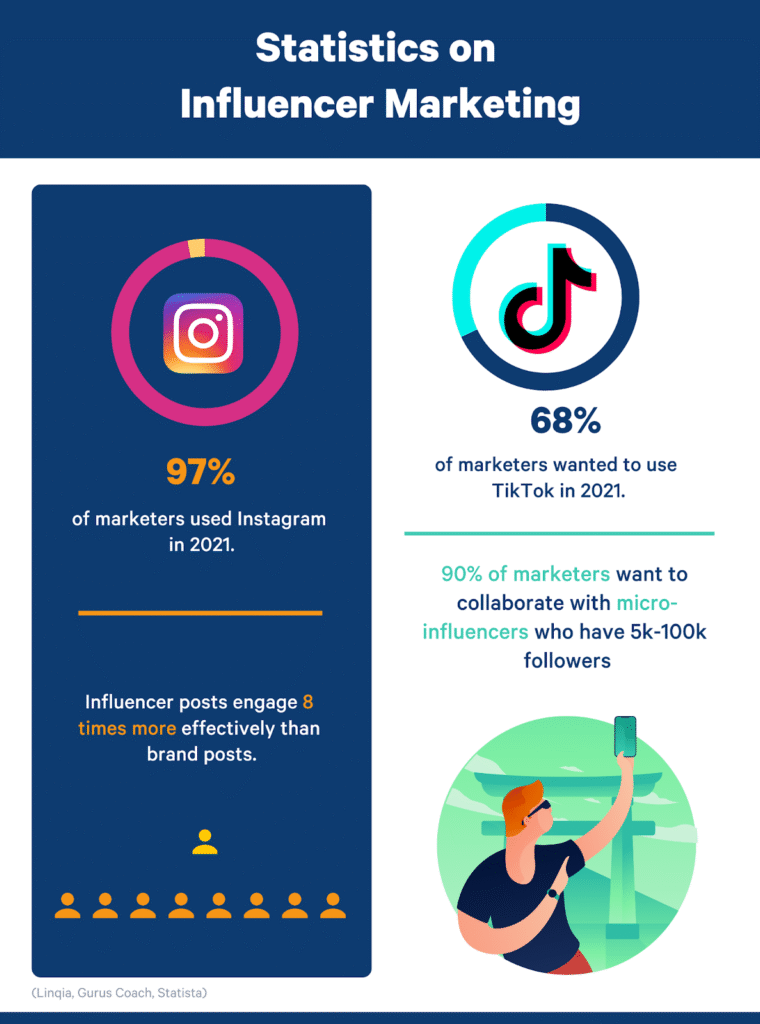
Social Proof and User Generated Content
User Generated Content (UGC) refers to content that is made by other “regular people”, other consumers.
UGC works like personal recommendations: an average consumer telling or showing their opinion to other prospective customers.
People trust their peers more than company representatives.
That is what makes UGC so effective.
- 60% of shoppers find new products on Instagram.
- 66% purchased from a new brand after seeing a social media post made by another consumer.
- 79% of online shoppers say that user generated content is highly impactful for their purchase decisions (compared to branded content (12%) and influencer content (9%))
- 80% would purchase more likely, if brands showcased UGC on the website.
- Consumers view UGC as 2.4 times more authentic than branded content.
- 85% are more affected by user generated visual content than brand’s photos and videos.
Sources: Nosto, Finances Online
Social Proof Statistics Generated by Trustmary
We at Trustmary have conducted our own research about social proof.
After all, we specialize in increasing your website conversions by using different social proof widgets!
Here are some of our key findings:
- eCommerce conversion rate grows by 67% when website visitors are shown customer reviews on the website.
- Service booking conversion rate grows by 29%.
- Contact requests increase by 22%.
- Satokausikalenteri learned that people who see customer video testimonials in the online store are more likely to purchase than those who did not see a video.
- Our client Mutjutin was able to reduce the marketing budget by almost 22% and increase sales by 140% by implementing customer reviews in Facebook and Instagram marketing.
- Their product page conversion rate increased by over 22% when they showcased review notifications.
- Another client was able to increase sales 32% by showcasing one video testimonial on the check-out page.
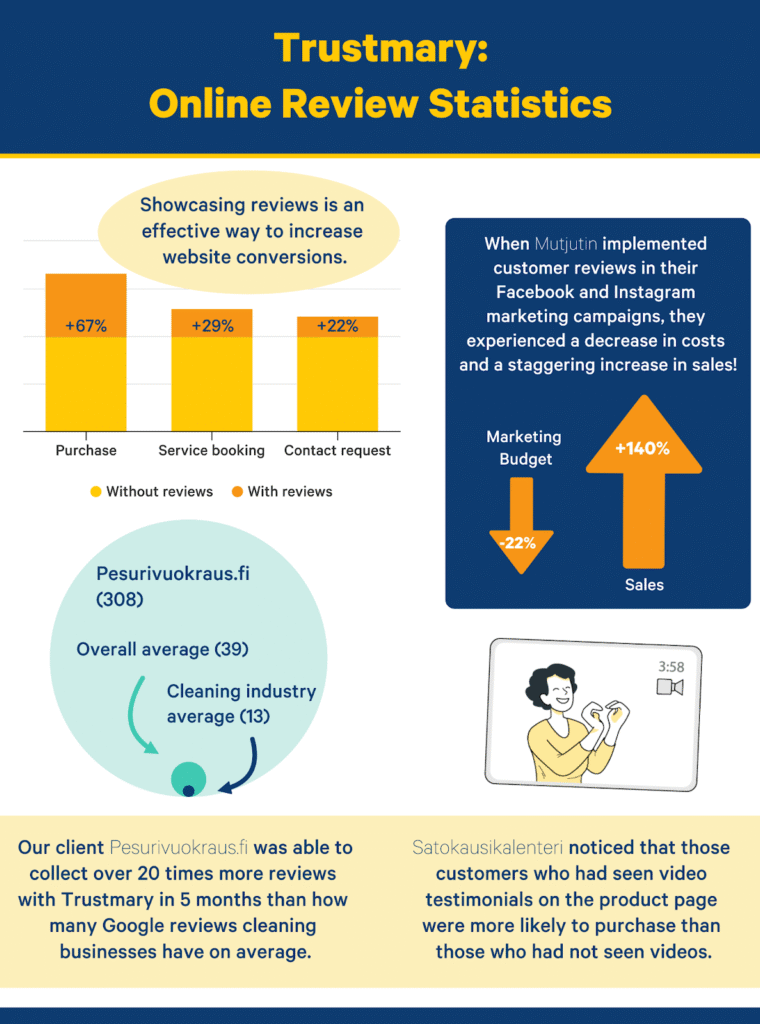
Implement Social Proof to Your Marketing Strategy
Now that you have seen the immense power of social proof, you have no excuses to ignore it.
It’s time to incorporate social proof in your own marketing strategy. Remember that 20% of effort brings in 80% of the results, as is proven by the 80/20 rule.
Accumulating social proof can take a while. The fastest way to start is
- Use the free Trustmary to collect testimonials and video testimonials from your current customers.
- Add demographic questions to surveys to further influence buying decisions by showing relatable content
- If you have reviews on an external site like Google or Facebook, import them to your own website.
- Incorporate social proof pop ups to the relevant pages of your website or ecommerce store.
Customer testimonials on sales pages make a great impact, like we saw from the case examples above.
Social proof pop ups create urgency and make online shoppers act faster.
Start a free trial or book a meeting with us and let’s plan a comprehensive social proof strategy for your website!
Sources and Further Reading
Sources
- Online reviews statistics to know in 2022, Qualtrics
- The Ultimate List of Online Review Statistics for 2022, Findstack
- The State of Influencer Marketing 2021, Linqia
- Testimonials Statistics 2020, Wyzowl
- The Benefits of Using Video on Landing Pages, Unbounce
- Online Reviews Statistics and Trends: A 2022 Report by ReviewTrackers, Reviewtrackers
- You Don’t Want A 5-Star Review, Northwestern
- Google Reviews Study: How Many Reviews Do Local Businesses Need?, Bright Local
- 77 Online Reputation Statistics for 2022, Status Labs
- 51+ Latest Social Proof Statistics & Trends 2022, Gurus Coach
- 2018 B2B Buyers Survey Report, Demand Gen Report
- Statista
- 60 Social Proof Statistics You Must Read: 2022 Data Analysis & Market Share, Finances Online
- Consumer Reviews - 2018 B2B Sales & Marketing Report, G2
- How COVID-19 Changed Online Reviews, Power Reviews
- 54 % of online shoppers read reviews before every purchase, digital
- Why B2B Reviews Should Be An Essential Part Of Your Marketing Mix, Forbes
- Micro-Influencer Marketing Guide: Benefits and Steps, InfluencerMarketingHub
Further Reading
- The Definitive Guide for Understanding the Power of Social Proof
- Social Proof Examples in B2B Marketing +How to Use Them
- 5 Easy Ways to Implement Visual Social Proof in eCommerce
- Online Reviews: Statistics That Will Blow Your Mind [2025]
- Video Testimonial Statistics That You Should Mind
- What is the average conversion rate for a website?
FAQ
What is social proof?
Social proof is a psychological phenomenon that makes people act like their peers. It is a powerful marketing tool that you can use to get more sales and increase trust.
What are types of social proof strategies?
Some social proof strategies are e.g.
- Reviews and testimonials
- User generated content
- Influencer marketing
- Referrals from friends and family
How can I leverage social proof?
Leveraging social proof can be as simple as asking your customers to write a review or post about you on social media. You can also implement social proof pop ups or other widgets to showcase reviews directly on your website for extra effectiveness.
In case you don't yet have raving Google reviews, go through these tips on getting more Google reviews.